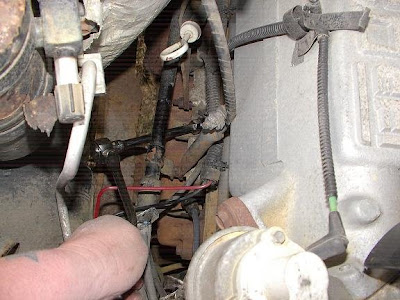Everybody and their uncle seems to be writing about Maine's L.D. 1020 and its progress in the legislature. Forgive me, but it's on my mind, too, so you're going to hear about it again.
The marriage equality bill came out of committee with a 11-2 ought to pass recommendation to the full legislature and it could face its first vote in the Maine Senate as early as tomorrow. Holy shit. That's fast. I guess they want to get it done and gone so they can get to work on the budget, which is a total nightmare.
I am hearing that the Senate has some members who think it might be a good idea to put the thing directly out to a referendum. What bullshit. That does nothing more than save them from having to make a tough choice. It would be much easier if their voters kicked the queers in the teeth than if they had to do it publicly than to make the more difficult choice and do what they know is right and support the bill.
We have a representative form of government. That means we elect people to represent us in Augusta. We volunteer for the job, and we elect them. Their job is to sit through the hearings, listen to the testimony, learn as much about an issue as they possibly can, and form an educated opinion about it. I don't want to care about the regulations having to do with lake levels or organic chickens, or tree growth or urban sprawl. I want my elected representatives to do their jobs and represent the interests of me and my community. That doesn't seem so tough, now does it?
Feh.
And our governor is being a first class cowardly dickhead for suggesting that the referendum thing might be a good idea. Since when is it a good idea to put the civil rights of a minority out to a vote of the majority? Certainly a fair number of decent, like-minded, progressive straight folks will vote to give us marriage rights, but most people, in the solitude of the voting booth, will mark the box that says "No, not for them." It is the cowardice that comes with anonymity. They don't have to look their gay, lesbian, bi, or trans neighbors, co-workers or family members in the eye and say "you don't deserve the same rights as me." They can hide behind the secret ballot. And they do. And I fear they still will.
I wrote a column for this week's paper. If you live in Hancock County, Maine, find a copy of the Mount Desert Islander and pick it up. I'll offer the rough draft of what I sent in here. I haven't seen the paper yet, but I have been assured that it got in with nice placement.
It's okay. It's only love.
Last week, I went with a group of friends from Hancock County to Augusta for the public hearing before the Joint Legislative Committee on the Judiciary of L.D. 1020 An Act To End Discrimination In Civil Marriage And to Preserve Religious Freedom. There were almost three dozen of us on the rented bus, we left very early and spent a very, very long day listening to testimony.
It makes for a grinding day listening to people give reasons why I deserve fewer, or different rights than them. It makes for stomach pains and pounding headaches to hear people accuse me and my community of horrible atrocities that are simply false and outrageous.
I live in Otter Creek with my partner. We have been together for seven years and we would very much like to be married. I am not asking for a gold-plated Cadillac, I just want the same rights and responsibilities that my parents have.
I’d like to know that we have the security that comes with marriage. That if I am injured in an accident that the hospital will take the word of my spouse regarding my medical decisions instead of that of my estranged father who suffers from Alzheimer’s Disease. As it stands now, legally, he has more rights to those kinds of decisions than she does. That’s not right.
Many of the people who spoke against the bill cited faith-based justifications for their feelings. One of the best parts of this bill is that no church, ever, will be asked to perform a marriage ceremony that goes against its teachings.
The process for getting married first begins at the town office with a piece of paper billed as “INTENTION OF MARRIAGE”. There are sections for the bride and groom to fill out, and it is returned and a marriage license is issued. In order for the couple to be married, they must exchange vows and swear their “I do’s” in front of two witnesses AND AN AGENT OF THE STATE. A notary public must certify and sign the marriage license for the marriage to be legal.
Many clergy are notary publics, which is why they will say “but the power vested in me by the State of Maine, I now pronounce you…”
My argument is this: Why are clergy doing Ceasar’s work? Why is a government-issued contract being certified in a church?
Yes, a marriage can be a holy thing. In the Catholic Church where I grew up, indeed it is a sacrament. But people can get married without any clergy present at all. Non-believers can stand up in front of a town clerk or a notary anywhere they choose and be married. Churches already don’t have to marry couples if they don’t want to. A Catholic and a Jew would not be married in either a synagogue or a Cathedral, yet they can be married. Why not, then, my partner and me?
I am not asking the Catholic Church of my childhood to perform the service; I have a Notary Public already picked out who has said he will be glad to perform our wedding. His name is Dennis Damon. He’s our State Senator, and he introduced this bill that will allow us to marry.
The legislative process is not speedy, but it is resolute. The bill went to a work session and was voted out of committee this week overwhelmingly “ought to pass” and is headed for a vote in the Maine Senate next week or the week after, depending on scheduling. After that it will go to the Maine House, led by our own estimable Hannah Pingree, then back to the Senate, once more through the House, and to the Governor’s desk for his signature to become law.
Along this path, there are opportunities for legislators to introduce amendments and this and that. Usually, on a piece of legislation as volatile as this, there is a movement to send it out to referendum. To do that would be wrong in so many ways it boggles my mind.
I voted for people whom I want to go to Augusta, sit through the hearings, do the homework, educate themselves on the issues and then vote in the best interests of the people in their districts. I did not send someone down there to be an empty barrel into which I can shout to be heard. I voted for people with brains and guts, and I expect them to use both when considering this legislation. Vote it up or vote it down, but don’t weasel around and try to avoid taking a stand. Legislators should state their positions and cast their votes. Elsie Fleming and Dennis Damon will do just that. All the others? Well, there’s no telling.
The civil rights of a minority ought never to have to pass the gauntlet of a statewide referendum vote. Imagine if the Emancipation Proclamation were put to a referendum… how many white voters would have freed slaves? Some would have voted for it, certainly, but not the majority. We had much more growing to do as a nation before we would (or will) achieve anything remotely resembling racial equality.
A referendum will be exhaustive and expensive. Millions will be spent on each side. Think what positive things we could do with that money instead of fighting a prolonged, nasty referendum fight. How many beds could be bought for domestic violence shelters? How many groceries could be bought for a food pantry? How many affordable housing units could be built with what will be spent on a referendum? We’ve got more important things to argue about in Maine right now – like the gaping hole in the budget – than whether two people who love each other should have the right to enter into a civil marriage and be treated like everyone else.
L.D. 1020 is about fairness in the civil sphere and freedom in the religious sphere. It will allow citizens to go into the town office and get a marriage license, and it will reaffirm the right of all churches to say “no, thank you” to any couple they do not want to marry. It’s time, Maine. It’s time for equality.



































